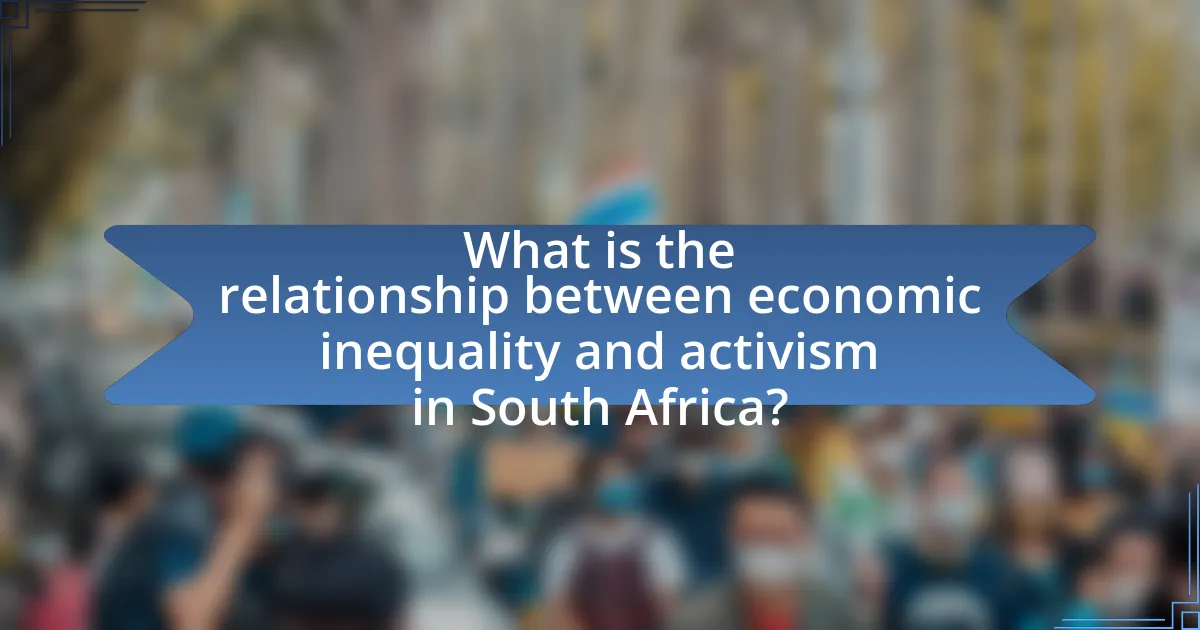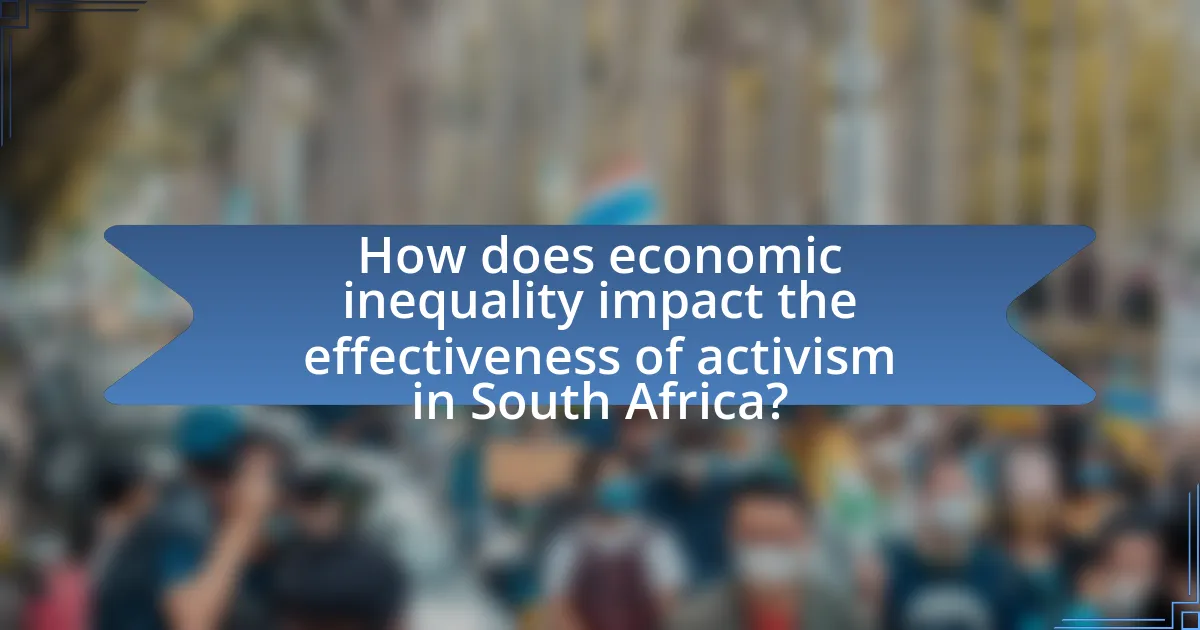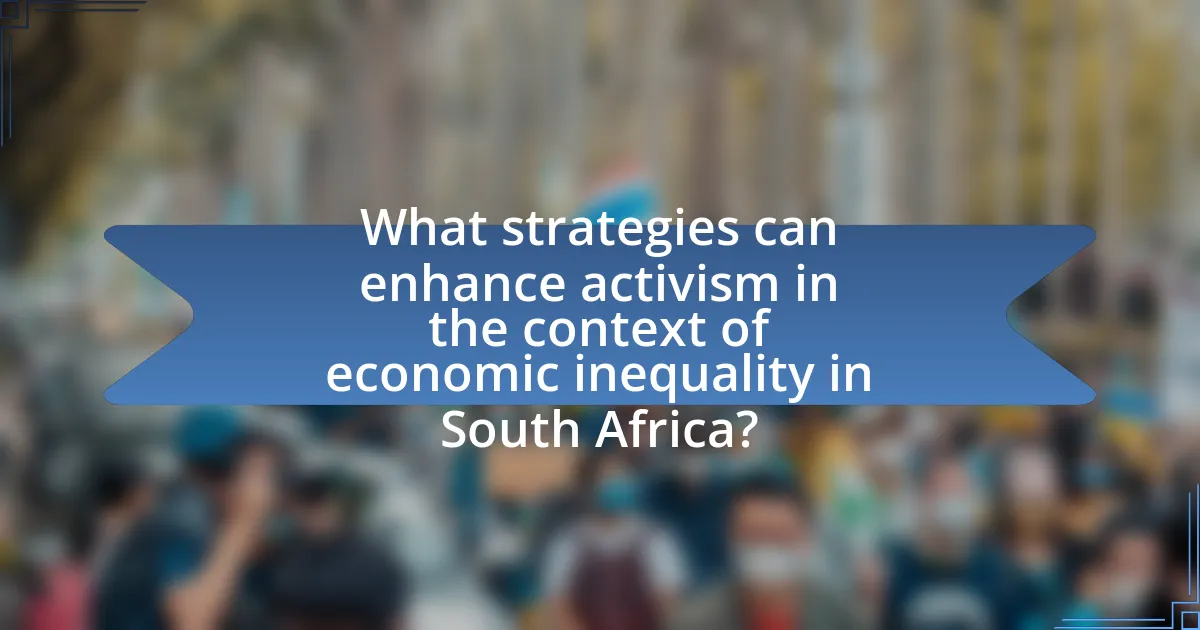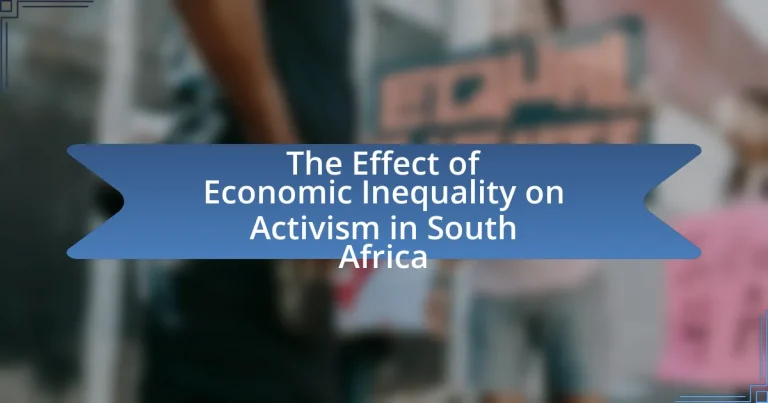The article examines the relationship between economic inequality and activism in South Africa, highlighting how extreme disparities in wealth and access to resources drive social movements. With a Gini coefficient of 0.63, the country faces significant challenges, including high unemployment rates and unequal access to education and healthcare, which fuel activism among marginalized communities. The piece discusses key indicators of economic inequality, the historical context of apartheid, and the various forms of activism prevalent in South Africa, such as grassroots organizing and labor movements. Additionally, it explores the impact of economic inequality on the effectiveness of activism, the challenges faced by activists, and strategies to enhance their efforts in advocating for systemic change.

What is the relationship between economic inequality and activism in South Africa?
Economic inequality in South Africa significantly drives activism, as marginalized communities mobilize to address disparities in wealth and access to resources. The high Gini coefficient of 0.63, indicating extreme inequality, has led to widespread social unrest and protests, particularly among the youth and disadvantaged groups. Activism manifests through movements advocating for land reform, better education, and improved living conditions, reflecting the urgent need for systemic change. Historical context, such as the legacy of apartheid, further fuels these efforts, as activists seek to rectify long-standing injustices and promote equitable opportunities for all citizens.
How does economic inequality manifest in South Africa?
Economic inequality in South Africa manifests through significant disparities in income, wealth distribution, and access to essential services. The Gini coefficient, a measure of income inequality, stands at approximately 0.63, indicating one of the highest levels of inequality globally. This economic divide is evident in the stark contrast between affluent urban areas and impoverished townships, where unemployment rates can exceed 30%. Additionally, access to quality education and healthcare is heavily skewed, with wealthier populations enjoying superior services while poorer communities face systemic barriers. These inequalities contribute to social unrest and activism, as marginalized groups increasingly demand equitable access to resources and opportunities.
What are the key indicators of economic inequality in the country?
Key indicators of economic inequality in South Africa include the Gini coefficient, income distribution, and unemployment rates. The Gini coefficient, which measures income inequality on a scale from 0 to 1, was reported at 0.63 in 2020, indicating high inequality. Income distribution data shows that the top 10% of earners receive a significant portion of the total income, while the bottom 50% earn a minimal share. Additionally, the unemployment rate, which stood at approximately 34% in 2021, exacerbates economic disparities, as joblessness disproportionately affects lower-income communities. These indicators collectively illustrate the extent of economic inequality in the country.
How do historical factors contribute to current economic disparities?
Historical factors significantly contribute to current economic disparities by establishing systemic inequalities that persist over time. For instance, the legacy of apartheid in South Africa created entrenched socio-economic divisions, where policies favored a minority while disenfranchising the majority. This resulted in unequal access to education, employment, and resources, which continues to affect economic opportunities for marginalized communities today. According to the World Bank, as of 2021, South Africa remains one of the most unequal countries globally, with a Gini coefficient of 0.63, reflecting the long-lasting impact of these historical injustices on wealth distribution and economic mobility.
Why is activism important in addressing economic inequality?
Activism is crucial in addressing economic inequality because it mobilizes communities to advocate for systemic change and policy reforms that promote equity. Through organized efforts, activists raise awareness about the disparities in wealth and access to resources, influencing public opinion and government action. For instance, movements like the Economic Freedom Fighters in South Africa have highlighted issues such as land redistribution and access to basic services, directly challenging the status quo of economic disparity. Research indicates that countries with active civil societies, including South Africa, tend to implement more progressive policies aimed at reducing inequality, demonstrating the tangible impact of activism on economic justice.
What role does activism play in social change?
Activism plays a crucial role in social change by mobilizing individuals and communities to advocate for justice, equality, and policy reform. Through organized efforts, activists raise awareness about social issues, influence public opinion, and pressure governments and institutions to implement changes. For instance, the anti-apartheid movement in South Africa, which involved widespread activism, successfully led to the dismantling of institutionalized racial segregation and the establishment of a democratic government. This historical example illustrates how activism can directly impact societal structures and promote significant legislative changes.
How can activism influence policy decisions related to economic inequality?
Activism can influence policy decisions related to economic inequality by mobilizing public opinion and pressuring lawmakers to address disparities. For instance, grassroots movements in South Africa, such as the Fees Must Fall campaign, successfully highlighted the financial burdens of education, leading to policy changes regarding tuition fees. Research indicates that sustained activism can lead to legislative reforms, as seen in the 2018 South African National Development Plan, which aimed to reduce inequality through targeted social policies. This demonstrates that organized efforts can effectively shape governmental priorities and resource allocation to combat economic inequality.
What types of activism are prevalent in South Africa?
In South Africa, prevalent types of activism include social justice activism, environmental activism, labor activism, and political activism. Social justice activism focuses on issues such as racial equality, gender rights, and LGBTQ+ rights, often driven by organizations like the Treatment Action Campaign, which advocates for healthcare access. Environmental activism addresses climate change and land rights, with groups like Earthlife Africa campaigning against pollution and advocating for sustainable practices. Labor activism is significant, with trade unions like COSATU fighting for workers’ rights and better wages, reflecting the country’s high levels of economic inequality. Political activism is also prominent, with movements like #FeesMustFall advocating for affordable education, highlighting the intersection of economic disparities and access to education.
What are the main forms of activism addressing economic issues?
The main forms of activism addressing economic issues include grassroots organizing, labor movements, and advocacy for policy reform. Grassroots organizing involves community-led initiatives that mobilize individuals to address local economic challenges, such as unemployment and access to resources. Labor movements focus on workers’ rights, advocating for fair wages and better working conditions, which are critical in addressing economic disparities. Advocacy for policy reform targets systemic changes in government policies to promote economic equity, such as tax reforms and social welfare programs. These forms of activism are essential in combating economic inequality, particularly in contexts like South Africa, where disparities are pronounced.
How do grassroots movements differ from organized campaigns?
Grassroots movements differ from organized campaigns primarily in their structure and approach to mobilization. Grassroots movements are typically decentralized, relying on community engagement and local participation to drive change, often emerging spontaneously in response to social issues. In contrast, organized campaigns are usually structured, with defined leadership, strategic planning, and resource allocation aimed at achieving specific goals. For example, the anti-apartheid movement in South Africa showcased grassroots activism through community-led protests, while organized campaigns like the African National Congress (ANC) employed formal strategies and leadership to navigate political landscapes. This distinction highlights how grassroots movements prioritize local voices and collective action, whereas organized campaigns focus on strategic execution and resource management.

How does economic inequality impact the effectiveness of activism in South Africa?
Economic inequality significantly undermines the effectiveness of activism in South Africa by creating barriers to participation and limiting access to resources. Activists from lower socioeconomic backgrounds often struggle to mobilize support due to financial constraints, which restricts their ability to organize events, disseminate information, and engage with broader communities. For instance, a report by the South African Institute of Race Relations indicates that the wealthiest 10% of the population holds over 60% of the country’s wealth, exacerbating disparities in political influence and access to platforms for activism. This concentration of wealth allows affluent individuals and groups to dominate public discourse, marginalizing the voices of those affected by inequality. Consequently, the impact of activism is diluted, as the most affected populations face systemic obstacles that hinder their ability to advocate for change effectively.
What challenges do activists face due to economic inequality?
Activists in South Africa face significant challenges due to economic inequality, primarily including limited access to resources, reduced public support, and increased repression. Economic inequality restricts funding opportunities for grassroots movements, making it difficult for activists to sustain campaigns and mobilize communities effectively. For instance, a report by the South African Human Sciences Research Council indicates that communities with higher economic disparities often experience lower levels of civic engagement, which diminishes the overall impact of activism. Additionally, activists may encounter heightened scrutiny and repression from authorities, as economic disparities can lead to social unrest, prompting governments to adopt more authoritarian measures to maintain control. This combination of resource limitations and increased state repression creates a challenging environment for activists striving to address social injustices linked to economic inequality.
How does limited access to resources hinder activism efforts?
Limited access to resources significantly hinders activism efforts by restricting the ability of activists to mobilize, communicate, and sustain their initiatives. Activists often rely on financial support, materials, and access to technology to organize events, disseminate information, and engage with the community. For instance, a study by the Institute for Justice and Reconciliation in South Africa found that grassroots organizations with limited funding struggle to maintain operations and reach broader audiences, thereby diminishing their impact. Additionally, without adequate resources, activists face challenges in securing venues for meetings, producing educational materials, and utilizing digital platforms for outreach, which are essential for effective advocacy.
What are the psychological effects of economic inequality on activists?
Economic inequality significantly impacts activists by fostering feelings of frustration, helplessness, and burnout. Activists often experience heightened stress and anxiety due to the perceived injustice of economic disparities, which can lead to emotional exhaustion and decreased motivation. Research indicates that individuals engaged in social movements may feel isolated and unsupported, exacerbating mental health issues. For instance, a study published in the Journal of Social Issues highlights that activists facing economic inequality report higher levels of psychological distress compared to those in more equitable environments. This distress can hinder their effectiveness and commitment to activism, ultimately affecting the broader movement for social change.
How does economic inequality shape public perception of activism?
Economic inequality significantly shapes public perception of activism by influencing how different socioeconomic groups view the legitimacy and effectiveness of activist movements. Individuals from lower-income backgrounds often perceive activism as a necessary response to systemic injustices that perpetuate their economic struggles, while those from higher-income brackets may view activism with skepticism, seeing it as disruptive or unnecessary. Research indicates that in South Africa, where economic disparities are pronounced, public support for activism is closely tied to personal experiences of inequality; for instance, a study by the Institute for Justice and Reconciliation found that marginalized communities are more likely to engage in and support activism aimed at addressing economic grievances. This dynamic illustrates that economic inequality not only affects the motivations behind activism but also shapes the broader societal narrative surrounding its importance and legitimacy.
What stereotypes exist about activists in economically unequal societies?
Activists in economically unequal societies are often stereotyped as being radical, disconnected from mainstream society, and primarily motivated by personal gain rather than genuine concern for social issues. These stereotypes arise from the perception that activists challenge the status quo and advocate for systemic change, which can be viewed as threatening by those in power. Additionally, activists may be seen as elitist or out of touch with the struggles of everyday people, particularly in contexts like South Africa, where economic disparities are stark. Research indicates that these stereotypes can undermine the credibility and effectiveness of activism, as they create barriers to public support and engagement.
How does media representation influence public support for activism?
Media representation significantly influences public support for activism by shaping perceptions and narratives surrounding social issues. When media outlets portray activism positively, highlighting its goals and the struggles of marginalized communities, public empathy and support tend to increase. For instance, studies have shown that coverage of protests and movements, such as the anti-apartheid struggle in South Africa, can mobilize public opinion and encourage participation. Research by the Pew Research Center indicates that media framing can affect public attitudes, with 70% of respondents stating that media coverage influences their views on social justice issues. Thus, the way media represents activism directly impacts the level of public engagement and support for those causes.

What strategies can enhance activism in the context of economic inequality in South Africa?
Strategies that can enhance activism in the context of economic inequality in South Africa include grassroots mobilization, digital advocacy, and coalition-building among diverse groups. Grassroots mobilization empowers local communities to organize and advocate for their rights, as seen in movements like the #FeesMustFall campaign, which successfully challenged rising university fees and highlighted broader economic disparities. Digital advocacy leverages social media platforms to raise awareness and engage a wider audience, exemplified by campaigns that use hashtags to draw attention to economic injustices. Coalition-building among labor unions, NGOs, and community organizations fosters a united front, amplifying voices and resources to address systemic inequality, as demonstrated by the collaboration between various groups during the 2012 Marikana miners’ strike. These strategies collectively create a more robust and effective activist landscape in South Africa.
How can coalitions between different activist groups be formed?
Coalitions between different activist groups can be formed through shared goals, mutual respect, and effective communication. Establishing common objectives allows diverse groups to unite their efforts, while fostering an environment of respect encourages collaboration. Effective communication, including regular meetings and open dialogue, ensures that all parties are aligned and can address any concerns. Historical examples, such as the anti-apartheid movement in South Africa, demonstrate that coalitions can amplify voices and increase impact when groups work together towards a common cause.
What are the benefits of collaboration among diverse movements?
Collaboration among diverse movements enhances the effectiveness of activism by pooling resources, knowledge, and networks. This synergy allows movements to address complex issues like economic inequality more comprehensively, as seen in South Africa, where various groups unite to tackle systemic challenges. For instance, the collaboration between labor unions and social justice organizations has historically amplified their collective voice, leading to significant policy changes and increased public awareness. Such partnerships can also foster innovation by combining different perspectives and strategies, ultimately driving more impactful social change.
How can shared resources improve activism outcomes?
Shared resources can significantly improve activism outcomes by enhancing collaboration, increasing access to information, and amplifying voices. When activists share resources such as funding, technology, and knowledge, they can pool their strengths, leading to more effective campaigns. For instance, a study by the Institute for Economic Justice found that collective funding initiatives in South Africa have enabled grassroots organizations to mobilize larger groups and sustain longer campaigns, resulting in increased visibility and impact. This collaborative approach not only reduces individual costs but also fosters a sense of community and solidarity among activists, ultimately driving more substantial social change.
What role does education play in empowering activists?
Education plays a crucial role in empowering activists by equipping them with the knowledge and skills necessary to advocate effectively for social change. Through education, activists gain an understanding of social issues, legal frameworks, and strategies for mobilization, which enhances their ability to organize and influence public policy. For instance, studies have shown that educated individuals are more likely to engage in civic activities and advocacy, as they possess critical thinking skills that enable them to analyze complex societal problems and propose viable solutions. In South Africa, where economic inequality is prevalent, education serves as a tool for marginalized communities to challenge systemic injustices and advocate for their rights, thereby fostering a more equitable society.
How can awareness campaigns address economic inequality effectively?
Awareness campaigns can effectively address economic inequality by educating the public about the causes and consequences of inequality, thereby fostering a collective demand for policy changes. For instance, campaigns that highlight the disparities in income and access to resources can mobilize communities to advocate for equitable policies, such as progressive taxation and improved social services. Research indicates that informed citizens are more likely to engage in activism; a study by the South African Institute of Race Relations found that increased awareness of economic issues correlates with higher participation in social movements. By utilizing data and personal stories, awareness campaigns can create a sense of urgency and solidarity, driving collective action towards reducing economic disparities.
What educational resources are available for activists in South Africa?
Activists in South Africa have access to various educational resources, including training programs, workshops, and online platforms. Organizations such as the South African NGO Coalition (SANGOCO) and the Institute for Justice and Reconciliation (IJR) offer capacity-building initiatives that focus on advocacy skills, human rights education, and community organizing. Additionally, online resources like the Activist Toolkit by the Open Society Foundation provide guides and materials tailored for grassroots movements. These resources are designed to empower activists with the knowledge and skills necessary to address economic inequality and promote social justice effectively.
What practical steps can individuals take to support activism against economic inequality?
Individuals can support activism against economic inequality by engaging in community organizing, advocating for policy changes, and participating in educational initiatives. Community organizing allows individuals to mobilize local resources and build coalitions that address specific economic issues, such as access to affordable housing or fair wages. Advocating for policy changes involves contacting local representatives to support legislation aimed at reducing inequality, such as progressive taxation or increased minimum wage laws. Participating in educational initiatives, such as workshops or seminars, raises awareness about economic inequality and empowers others to take action. According to the South African Human Sciences Research Council, grassroots movements have been effective in addressing economic disparities, demonstrating that collective action can lead to meaningful change.


